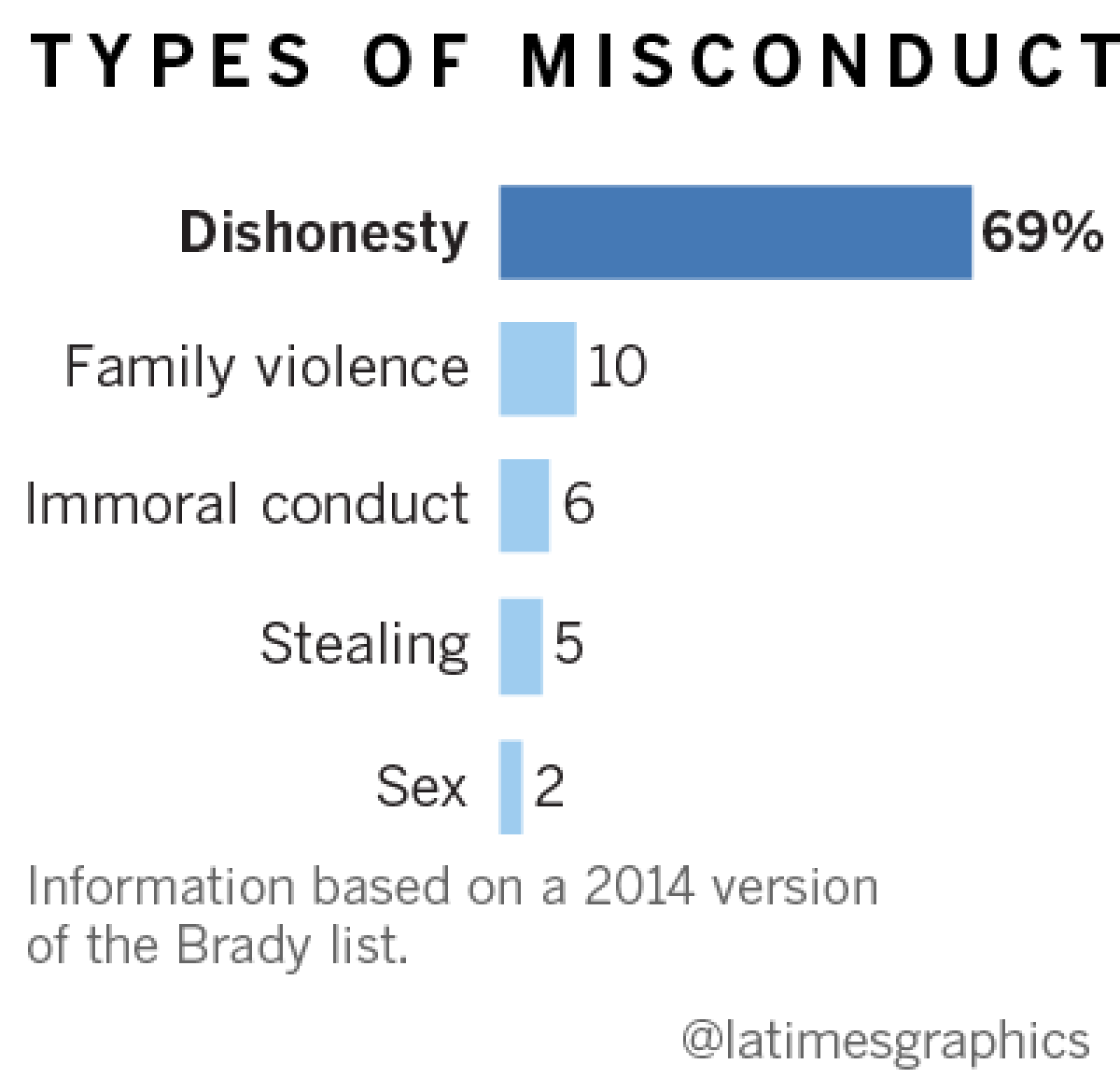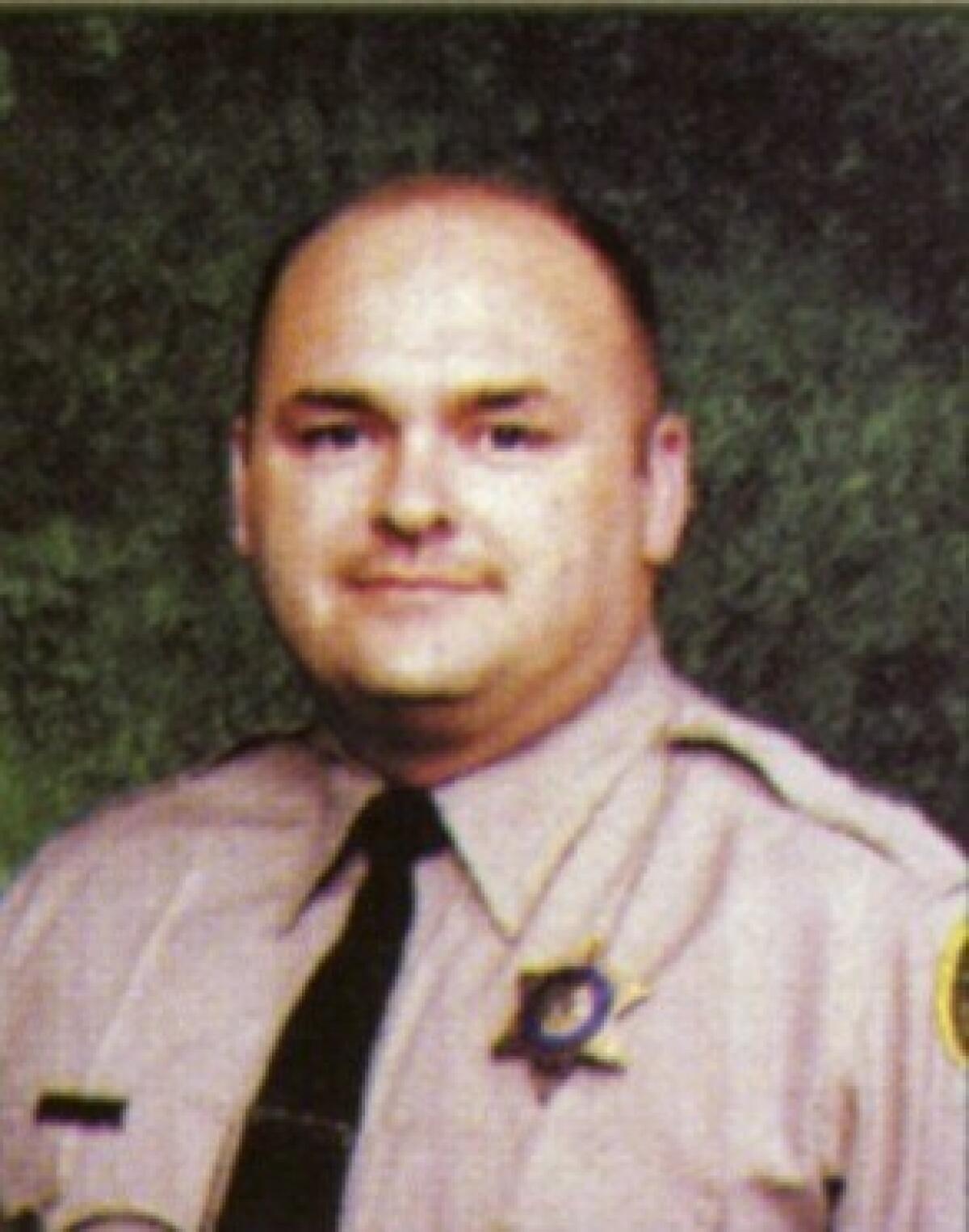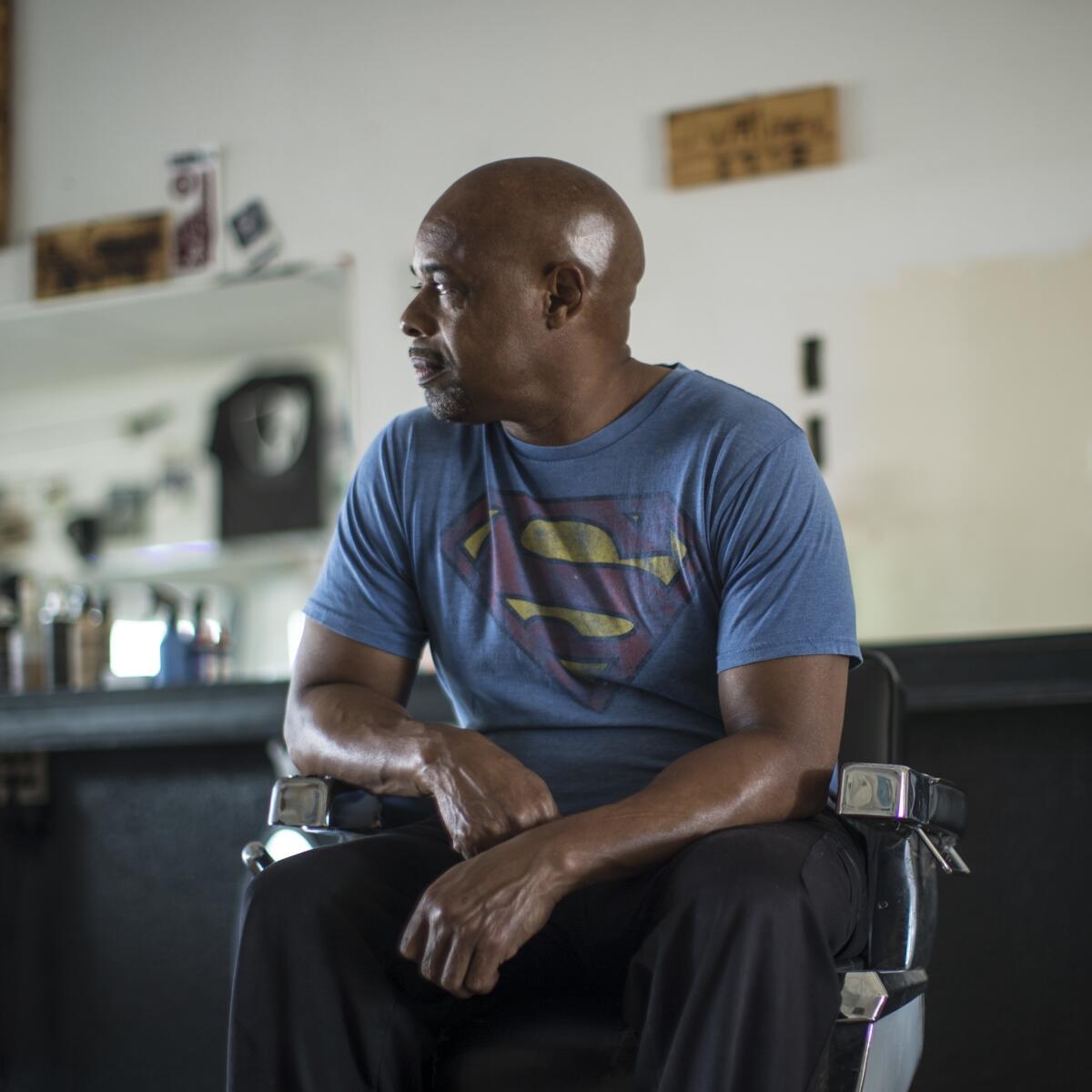Sex. Lies. Abuse. How these L.A. deputies landed on a secret 2014 list of problem officers

About 300 L.A. deputies are on the Brady list, a secret record of problem officers.
- Share via
It was a critical piece of evidence: an inmate’s shirt, bloodied from a jailhouse brawl.
When it went missing, Deputy Jose Ovalle had an idea.
He picked out a similar shirt, doused it with taco sauce and snapped a photograph, which was booked into evidence with the Los Angeles County Sheriff’s Department, law enforcement records show.
When confronted later, the deputy admitted to faking the blood.
Ovalle kept his job, but his name was placed on a secret Sheriff’s Department list that now includes about 300 deputies with histories of dishonesty and similar misconduct, a Los Angeles Times investigation has found. The list is so tightly controlled that it can be seen by only a handful of high-ranking sheriff’s officials. Not even prosecutors can access it.
Amid growing public scrutiny over police misconduct, Sheriff Jim McDonnell wants to give the names on the list to prosecutors, who are required by law to tell criminal defendants about evidence that would damage the credibility of an officer called as a witness. But McDonnell’s efforts have ignited a fierce legal battle with the union that represents rank-and-file deputies.
The dispute, which the California Supreme Court is expected to decide next year, is playing out in a state with some of the nation’s strictest secrecy laws on police misconduct. California is among 22 states that keep officer discipline from the public, but it is the only one that blocks prosecutors from seeing entire police personnel files.
The Sheriff’s Department’s roster of deputies, known as a “Brady list,” was compiled in 2014 under McDonnell’s predecessor, interim Sheriff John Scott, to keep track of officers with histories of misconduct that might affect their credibility in court. The list has evolved over time, and last fall the department notified several hundred deputies that their names were on the list and offered them the chance to object if they believed there had been a mistake.
Times reporters reviewed a version of the roster, dated 2014, and scoured court and law enforcement records for details of how deputies landed on it.
The documents reviewed by The Times offer the first public glimpse of officers whose misconduct the Sheriff’s Department has decided should be reported to the courts.
The deputies have been identified as potential witnesses in more than 62,000 felony cases since 2000, according to a Times analysis of district attorney records. In many of those cases, the deputies’ misconduct would probably have been relevant in assessing their credibility.
Law enforcement and court records show:
One deputy on the list endangered the lives of fellow officers and an undercover informant when he warned a suspected drug dealer’s girlfriend that the dealer was being watched by police.
Another pepper-sprayed an elderly man in the face and then wrote a false report to justify arresting him.
A third pulled over a stranger and received oral sex from her in his patrol car.
The list also includes several deputies still with the department who were convicted of crimes — one for filing a false arrest report and another who was charged with domestic battery but pleaded no contest to a lesser offense. In other cases, prosecutors sharply criticized the deputies’ actions but declined to pursue criminal charges against them.


The legal dispute over the list underscores a larger nationwide clash over police accountability. Authorities are facing growing pressure from the public to reveal more about police misconduct and the way officers do their jobs. But law enforcement unions in California have used their political power to push back against efforts to increase disclosure.
The union representing sheriff’s deputies argues that giving prosecutors the names on the list would needlessly harm the careers of deputies and could jeopardize numerous criminal prosecutions in which they played a role.
“Do we go back and overturn every conviction now?” asked Elizabeth Gibbons, a lawyer who has represented the Assn. for Los Angeles Deputy Sheriffs. “That’s a can of worms that gets opened if the court adopts the department’s argument in this case.”
The Times found several errors in the 2014 version of the list, including two deputies who were named even though investigations failed to substantiate allegations of dishonesty and a third who successfully appealed a finding that he had written a false report. It’s unclear how many names have since been removed or added or whether deputies on the 2014 list are included in the current version.
All the deputies named in this article, though, have been convicted of crimes, found by sheriff’s investigators to have committed misconduct or been flagged by prosecutors for behavior that raised serious concerns about their conduct.
Accused of molesting a teen, now a sergeant
Casey Dowling was a 28-year-old deputy more than two decades ago when a 14-year-old girl informed him that she had been the victim of a knife attack. The girl said Dowling told her to sit in his patrol car and then reached under her blouse and bra and touched her breast, according to a district attorney’s memo written at the time.
The girl said Dowling drove her home and followed her into her bedroom. There, she said, he asked if she was wearing panties and touched her again under her bra, according to the memo. Her mother said she saw Dowling in the bedroom, but walked away when the deputy moved toward the door as if he were leaving.

When confronted later by the teen about what happened, he contacted his union, according to the 1996 memo written by Deputy Dist. Atty. Bryant Bushling.
Bushling determined that there were “several circumstances which support the conclusion that Deputy Dowling has committed the violation alleged.” The deputy’s failure to take a crime report about the knife attack, his entering the girl’s bedroom and his failure to report the molestation allegations before contacting his union “vitiate his credibility,” the prosecutor wrote.
But Bushling declined to file criminal charges, concluding there was not enough evidence to corroborate the girl’s claims “beyond a reasonable doubt.”
Civil service records show that the Sheriff’s Department discharged Dowling in 1997 for “immoral conduct” and that he filed an appeal.
What happened is confidential, but Dowling got his job back.
Documents detail misconduct by L.A. sheriff’s deputies »
Reached by The Times, Dowling said he would speak about the incident only after verifying with the department what he was allowed to disclose.
“Nothing I say to you is going to help my situation anyway,” he said. “The whole thing sucks and I was reinstated.”
In a follow-up conversation, Dowling said he had proof he is not on the current Brady list but would not provide it.
An attorney who represented Dowling in an unrelated civil case a few years ago said the Sheriff’s Department placed the deputy on leave but never discharged him.
“I can tell you through a moral certainty I remember he was relieved of duty for two months because of allegations against him,” Bradley C. Gage said. “That was investigated and found not to be true, he got his job back, end of story.”
Two days after this article was published, Gage sent The Times a Sheriff’s Department letter saying that Dowling had recently been removed from the Brady list.
According to the letter, Dowling had previously been accused of making false statements but had reached a settlement with the department in which the charge was changed to “unfounded.” The letter, sent to Dowling in March, gave no other details about the case.
Dowling, who was later promoted to sergeant, was assigned to the department’s parks bureau as of August. His pay last year, including overtime and other earnings, was $189,000.
Casey Dowling
Accused of molesting a 14-year-old girl after she told him she had been the victim of a knife attack.
He earned $189,000 last year.
How these Sheriff’s deputies landed on the Brady List
For the teenage girl, the incident took a traumatic toll, she said in an interview with The Times. Now 36, she said she considered suicide, was overly self-conscious about her body and had anxiety about being touched.
She tried therapy and for a time used methamphetamine. Halfway through her sophomore year, she said, she dropped out of high school.
“If I didn’t have the run-in with him, I know my life would be different,” she said. “I would have continued to be the little girl that I was. I wouldn’t have lost my innocence so early.”
The Times generally does not identify people who report being victims of sexual assault.
She said she had been too terrified to stop Dowling. When no charges were filed, she said, it felt as if she wasn’t believed.
“I just let it go because I was scared of him and his gun and his uniform,” she said. “I was scared of what he could get away with.”


Born of scandal
The Brady list — named for a landmark 1963 Supreme Court decision that requires prosecutors to alert defendants to favorable evidence, including information that could undermine the credibility of government witnesses — was established more than three years ago when the Sheriff’s Department was mired in scandal.
An FBI investigation of inmate abuse by deputies found years of excessive force and coverups. More than 20 officials, including former Sheriff Lee Baca, were convicted of crimes in the wake of that investigation.
In 2014, after Baca stepped down, officials combed through officers’ histories for misconduct involving “moral turpitude.” Deputies added to the list were found by internal investigators to have made false statements, written false reports, misappropriated property, obstructed an investigation, engaged in discrimination or harassment, accepted bribes or other improper gifts, used unreasonable force or been violent with a family member.
McDonnell, who took over as sheriff that December, ramped up the effort to develop the Brady list. A Sheriff’s Department spokeswoman declined to comment, citing officer privacy laws and the pending case before the Supreme Court.
Tell us your story
We're investigating L.A. deputies with histories of misconduct. Submit a tip.
The list reviewed by The Times includes some deputies who, despite previous misconduct, were given jobs in patrol or as detectives — assignments in which testimony can be crucial. The department fired some deputies whose names are on the list, but at least 13 appealed and got their jobs back.
The 2014 version of the Brady list reviewed by The Times identifies 277 officers. The group represents about 3% of the department’s roughly 9,400 sworn personnel. About two-thirds of those named on the list are still with the department.
They include Sgt. Timothy Jimenez, who was working as a bailiff at the Norwalk courthouse in 1995 when he learned that Cypress police detectives were planning to use a confidential informant to bust a dealer suspected of having a stash of methamphetamine and a machine gun.
Jimenez had attended high school with both the informant and the dealer, according to a district attorney’s memo.
When detectives searched an auto body shop where the drug dealer was doing business, they did not find the weapon or large amount of drugs they had expected. The dealer’s girlfriend later told investigators Jimenez had warned her about the informant and suggested the dealer be careful, according to the memo. She in turn tipped off her boyfriend.

In the 1997 memo, Deputy Dist. Atty. Valerie Aenlle-Rocha concluded that Jimenez’s actions put his colleagues’ lives in peril and “were reckless and a blatant betrayal of his fellow law enforcement personnel.”
Despite the prosecutor’s finding that Jimenez intended to obstruct justice, she declined to file charges.
Jimenez, approached recently at his residence, said he did not want to talk to reporters.
“It happened 22 years ago and I don’t even remember what happened,” he said, adding that the allegations were “false.” He would not answer further questions.
Jimenez, who was promoted to sergeant in 2012, was assigned to the Walnut station as of August. His pay last year, including overtime and other earnings, was $140,000.

Fighting to keep misconduct private
Law enforcement agencies in at least 22 California counties, including San Francisco and Sacramento, already send prosecutors the names of problem officers. Local agencies, such as the Los Angeles Police Department, do not.
In some counties, police unions have threatened lawsuits to stop the practice. In Ventura, for example, that threat led to a deal with prosecutors that allows the unions to ask that officers be removed if the union believes they are erroneously or unfairly on the list.
When Sheriff McDonnell tried to give the names of “Brady” officers to prosecutors, the deputies’ union sued, arguing the move would violate California’s officer confidentiality laws.
In July, a state appeals court ruled that the names cannot be revealed even in pending criminal cases in which the officers could testify. The court concluded that defendants are already able to gather the information they need by asking a judge to review the officer’s file for relevant information that could affect the case.
State law, however, bars judges from handing over information about complaints more than five years old. And many defense attorneys say that even if they can persuade a judge to review the records, they are rarely given enough to assess the credibility of police witnesses.
If the California Supreme Court upholds the decision, it would prevent agencies across the state from sharing the names of problem officers. But a high court ruling that allows disclosure could compel prosecutors to examine prior cases where those deputies testified, potentially jeopardizing countless convictions.
Dist. Atty. Jackie Lacey revised her office’s policy earlier this year so that police agencies can send her the names of problem officers. But Lacey has remained on the sidelines in the dispute over the Sheriff's Department’s Brady list.
In a recent interview, she said she is “in a tough spot” because more than 200 investigators who work for her office are members of the deputy union that is suing the sheriff. Still, she said she supports McDonnell's efforts.
“I think the sheriff is trying to do the right thing,” she said.

Tarnishing a career
The deputies’ union has argued that the list is the product of a deeply flawed disciplinary system “infested with personal animosity” and unfairly singles out what many would consider to be minor infractions. One mistake shouldn’t tarnish a deputy’s career, union lawyers argue.
A review of the list shows that more than 60 deputies were given light punishments — ranging from a written reprimand to a five-day suspension — some for offenses such as lying about an illness or an absence from work.
But more than 40 deputies were given lengthy suspensions for writing false reports, immoral conduct or family violence. As a result, even serious cases of misconduct could remain off-limits to the court if the deputies were called to testify in criminal cases.

In 2007, Christian Chamness was honored as “deputy of the year” for his work policing gang members for the sheriff’s Lancaster station. “He is a man of honor and integrity,” the station captain told a news outlet at the time.
But a few months later, Chamness was accused of lying about why he pepper-sprayed an elderly Army veteran in the face.
He and other officers had accused several men at a local barbershop of disobeying orders to stay inside the building while deputies handled an unrelated call nearby about a man with a gun.
Chamness claimed that as deputies began making arrests in the barbershop, Raymond Davison, 73, cursed at them for arresting his adult son and blocked their path out of the building.
“He began to advance on me,” Chamness wrote of Davison, who was arrested and charged with resisting or delaying a peace officer. “I ... ordered him once more to step aside. He refused so I sprayed him with a 3- to 4-second burst.”
But a security recording from outside the barbershop contradicted Chamness.
The video, obtained by The Times, shows Davison engaging in a tense conversation with the deputies, who had already walked outside. Suddenly, Chamness pulls out his pepper spray, points it at Davison — whose arm is held back by another deputy — and sprays the man’s face three times.
Charges against Davison and three other men arrested at the barbershop were dismissed after the video was shown to sheriff’s officials. The county paid the men $195,000 to settle a lawsuit alleging false arrest and battery.
A report by the Sheriff’s Department’s watchdog said the case “caused a firestorm of issues” and that four deputies were disciplined. Chamness was suspended for 25 days for making a false report and unreasonable force, county records show.
“We dispute any accusation that Deputy Chamness intentionally misrepresented any of the events that day,” Adam Marangell, an attorney for the deputy, said in a recent interview with The Times. He declined to comment further.
After the arrest, Davison became withdrawn, said his son. He had been suffering from congestive heart failure, and his health deteriorated rapidly, Keith Davison said. His father died in 2013.
“He always told us not to go to jail, and we went to jail together that day,” he said. “That bothered him a lot. … It took his spirit away.”

In June, Chamness was awarded the sheriff’s “Legendary Lawman Pin” for serving 15 years in patrol. His pay last year, including overtime and other earnings, was $135,000.
“I felt threatened”
In 2000, Deputy Scott Maus was on patrol in Industry when he began flirting with a woman in another car. What happened next is detailed in a district attorney’s memo obtained by The Times:
Maus turned on his red light and pulled the woman over on the side of a freeway. He persuaded her to follow him to the parking lot of the Puente Hills Mall, where she got into his patrol car.
Maus groped the woman and didn’t stop when she told him he was hurting her, she told authorities. The woman gave the deputy oral sex and said he penetrated her with his fingers, according to the memo.
The next day, the woman reported the encounter to authorities, saying that while Maus hadn’t used force or threatened her, she didn’t consent and she felt intimidated by an armed deputy in uniform, according to county records.
“I felt threatened. I felt that I was in no way able to leave the situation until whatever he wanted was done. And I felt that … I was at harm if I tried to,” she said in a deposition taken as part of a lawsuit she filed against the county.
Investigators found semen in Maus’ patrol car, on his trousers and on the woman’s pants. The deputy admitted what had happened, but said it was consensual.
The county paid $150,000 to settle the case and acknowledged that the woman’s medical records showed she suffered from post-traumatic stress disorder after the incident.
The district attorney’s office considered filing sexual assault charges against the deputy but concluded there was insufficient evidence to prove the sex acts were against the woman’s will.
The same year, Maus was disciplined for immoral conduct, according to a county memo regarding the settlement.
Approached at his house, Maus declined to answer questions and threatened to call the police.
As of August, he was assigned to MTA headquarters. His pay last year, including overtime and other earnings, was $210,000.

Providing the Brady list to prosecutors is just one of several moves by the Sheriff's Department toward reform in the wake of the jail scandal that brought down Baca and other officials.
Sheriff McDonnell has recently increased penalties for lying and falsifying reports. New discipline guidelines recommend firing instead of suspending deputies for many types of dishonesty.
But McDonnell has also noted that misconduct must be placed in context. He argues that some deputies should be considered for “redemption” if they’ve improved in the years since their wrongdoing.
In April, he promoted Roosevelt Johnson from captain to commander.
Nearly two decades ago, Johnson was suspended for 30 days for making a false statement and putting false information in records when he was a deputy, according to a sheriff’s personnel document reviewed by The Times. Johnson did not return calls for comment.
Johnson has been given at least 14 commendations in his career, including three for “exemplary conduct,” according to the personnel document.
Ovalle, the deputy who was disciplined for creating false evidence by using taco sauce to resemble blood, has also moved up in the department despite that 2003 incident. The following year, he saved a woman from a burning car, according to a department publication. He was awarded a gold medal for meritorious conduct.
His discipline would remain in the shadows until 2008, when Ovalle arrested a suspected gang member and testified that he recovered a gun he saw the man throw to the ground, according to court records.
A defense attorney disputed the deputy’s account and filed a motion seeking any records in his personnel file about possible dishonesty. When Ovalle's previous wrongdoing came to light, a deal was struck and the suspected gang member was allowed to plead to a lesser charge.
Afterward, the prosecutor in the case notified his office that Ovalle’s actions needed to be included in the agency’s own database of problem officers, and the notification triggered an investigation into whether the deputy should be criminally charged.
That inquiry found Ovalle had previously admitted his misconduct as part of a settlement in which the Sheriff's Department agreed not to fire him, according to a 2011 district attorney’s memo. The office declined to charge the deputy because the three-year legal deadline had long passed, the memo said.
Ovalle told The Times he would rather not speak about the discipline. “It was a long time ago,” he said.
But while testifying in a 2010 drug case, Ovalle described his actions as a “huge mistake that I regret to this day.”
“I was a naive deputy — a brand-new deputy only two years on,” he said, according to a court transcript of his testimony. “It damaged my career forever.”
Weeks after it was determined that Ovalle would not face charges, he was promoted to sergeant. He was assigned to the department’s Century station in Lynwood as of August. His pay last year, including overtime and other earnings, was $235,000.
He has been listed as a potential witness in hundreds of cases.
We’re investigating L.A. deputies with histories of serious misconduct. Send us a tip.
Twitter: @mayalau @bposton @corinaknoll
Additional credits: Illustrations and graphics by Ally J. Levine. Produced by Sean Greene.
UPDATES:
9:55 p.m. Dec. 10: This article was updated to add that the Sheriff’s Department sent Dowling a letter in March notifying him that he had been removed from the Brady list.
This article was originally published at 5 a.m. on Dec. 8.
Sign up for Essential California
The most important California stories and recommendations in your inbox every morning.
You may occasionally receive promotional content from the Los Angeles Times.










